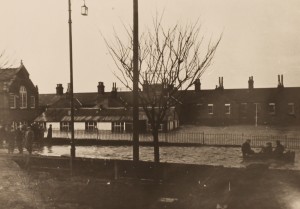Recently, we have been uploading a collection of oral history interviews conducted by The Harwich Society between 2009 and 2014 (Catalogue Reference SA 49/1/2).
These twenty-four interviews are just the first instalment of an ongoing project to record the experiences of current and former residents of Harwich and Dovercourt. As with most collections of oral history interviews, they reveal shared experiences but also how life varied even in one town depending on personal circumstances.

The playground of Harwich Junior School was flooded to a depth of 1½ metres (T/Z 241/1).
Most of the recordings touch on the 1953 flood. On the night of Saturday, 31 January, a storm surge caused the sea to overwhelm flood defences along the eastern coast of Britain. Harwich was one of the places affected, and the traumatic experience is unsurprisingly etched on the town’s corporate memory.
Even here, experiences varied. Some residents in Dovercourt only knew about it from news bulletins on the television. But in the Bathside area, the water rose to the first floor of people’s houses. Tom Bell and Danny Goswell, then young lads who belonged to the sailing club, were kept busy ‘fishing people out of houses’ in boats, ‘rowing around doing what we could’ (SA 49/1/2/12/1).
Evacuees sought refuge in the drill hall, where the Salvation Army was handing out blankets and cups of tea, before being billeted with family members or kind-hearted strangers with rooms to spare. The water took a week to recede, and the houses were permanently damaged. Ruby Cooper-Keeble recalls how they lost all their possessions. By the time the family moved back to the house, it had been cleaned out and redecorated, but the smell ‘stayed with it for years and years’, and ‘you could actually scrape the salt off the [wall]paper’ as it seeped out of the walls, residue from the sea salt water that flooded the home (SA 49/1/2/9/1). But as a child, she still saw the ordeal as something of an ‘adventure’.
Some people, such as Mr and Mrs Moore, never moved back (SA 49/1/2/14/1).
The interviews are full of memorable details that bring the event to life: tables laid for breakfast that neatly settled back into place once the water receded; the vigour of local hero Leonard ‘Pummie’ Rose in organising the rescue operations. The stories take different tones. Tom and Danny chuckle over how, after working all day in rescue boats, they still had the energy to go out in the evening. ‘Commandeering’ a dinghy tied up outside the police station, they rowed down the main road to the Spread Eagle pub that remained defiantly open, to enjoy a couple of Vimtos before rowing home.
On the opposite end of the spectrum, recalling the childhood trauma of that long, cold, dark night spent trapped in the bedroom waiting for rescue affected one interviewee so much that it sounds as if he had to pause during the interview to compose himself.
Whether they were only onlookers or whether they lost everything, when listened to together the interviews reveal how the town rallied together to overcome this ordeal – as they had done just ten years earlier during the Second World War. From the family who tirelessly worked to restore their grandparents’ house to normal in time for Christmas (interview with Diane Butler, SA 49/1/2/11/1), to the boy who joined with his friends to build a sea wall in the sand when they moved back, ‘in our own simple way to try and stop the waves coming again’ (interview with Ray Chippington, SA 49/1/2/22/1), the town was determined to recover. And what better way to cheer flagging spirits than travelling in a ‘cavalcade of coaches’ to a football match at Wembley to support your local team in the FA Amateur Cup final? Harwich and Parkeston Football Club’s finest hour was among the happier events of 1953, as recalled by Malcolm Carter (SA 49/1/2/16/1).
The collection covers other topics as well, including experiences during the Second World War; growing up and working in Harwich; and how the town has changed. We are grateful to The Harwich Society for taking the time to capture these memories, and for allowing us to make them publicly available. We are also grateful to the participants who, as June Cummings describes, had to relive the events in the act of sharing them (SA 49/1/2/20/1).
You can listen to these oral history interviews in the Playback Room at the Essex Record Office, Chelmsford, or, thanks to our Heritage Lottery Funded You Are Hear project, in the comfort of your own home through Essex Archives Online.
It is not surprising that such a momentous event crops up in several of our other collections. You can search the subject index term ‘Floods’ to find related material, such as this film footage of the floods on Canvey Island. Or look up Hilda Grieve’s authoritative work on the 1953 floods in Essex, referred to in some of these clips: The Great Tide: The story of the 1953 flood disaster in Essex (copies available in the Searchroom Library or in branch libraries across Essex).
Further afield, the East Anglian Film Archive holds a compilation of film footage of the floods which reveal the devastation caused. You can watch it for free on their website here.
Does your community have a story that should be recorded? Do you want to undertake your own oral history project? Contact us to find out more about the oral history training we provide.
